Veteran’s Testimony – Henry Cymerman 307th Station Hospital / 826th Convalescent Center

Picture of Captain Henry Cymerman, MC, O-499838, taken in London, May 1944.
Introduction:
Bernard Cymerman met my grandmother, Leokadja (Liba) Grynfarb, through a match-maker and they married in Warsaw in 1908. She obtained her diploma from the Czar’s School of Midwifery, Warsaw Chapter, and practiced as a midwife. Their only child, Herman/Henry, was born January 22 / February 6, 1910 (Julian/Gregorian calendar). Henry’s interest in medicine was most probably influenced by his mother.
The family lived in a cosmopolitan neighborhood on Marszalkowska Street in Warsaw. My father described it as “the Fifth Avenue of Warsaw”. He went to a local school where they studied traditional subjects in a humanistic curriculum: languages, science, history, classics. But Henry preferred soccer and girls and generally hanging out with friends. When he left for University at age 18, he exchanged souvenir photos with his friends – we have a large collection of photos of girls, inscribed to Henry.
At the University of Montpellier in France, he studied pre-med and then went on to the University of Geneva, Switzerland, where he completed his Doctor of Medicine degree in 1934. At this point, his aunt who was settled in New York, urged him to come to the States where she had found him a nice girl. Henry Cymerman and Anne Rose were married in Brooklyn, New York, on 18 April 1935. They would raise 2 daughters; Isabel – born in 1941, and Caryl – born in 1944.

Copy of Post Telegram dated 12 October 1942 addressed to First Lieutenant Henry Cymerman (commissioned 10 Oct 42), instructing him to proceed to Baltimore, Maryland and report to the Commanding General, Third Service Command, to which he was assigned as from 26 October 1942. The Appointment Letter dated 26 October 1942 assigned him for duty with the 1318th Service Unit, Camp Pickett, Virginia.
After their honeymoon in Geneva, where Dr. Cymerman submitted his thesis “Réactions de Bordet-Wassermann négatives dans les syphilides florides non traitées” in 1935 (Bordet-Wassermann’s Test or Reaction; term that applied to serological tests for syphilis –ed), they returned to Brooklyn, New York. Here Henry began internship and residency and opened a small general practice office in the apartment they lived in, which was near his brother-in-law’s pharmacy.
By this time, his parents, Bernard and Liba, had already left Warsaw, Poland, and gone to Palestine. They sailed from Marseille, France, on the French ship, S/S “Le Sphinx”, arriving in Haifa 7 October 1934. They rented an apartment in Haifa, Palestine (later State of Israel) and planned to start a new life. But their only child had made his decision to remain in the United States and so they made their way to New York in 1937.
Henry Cymerman worked as an Assistant in Medicine at Queens General Hospital, New York, and also served an Internship at Beth-El Hospital, Brooklyn, New York (1 January 1936 > 1 January 1937).
He obtained his medical license as a private General Practitioner in the State of New York, 1 July 1937, and would remain attached to Queens General Hospital for quite a while, still being affiliated with it after the war. He was a Resident Practitioner at the Jewish Sanitorium and Hospital for Chronic Diseases, Brooklyn, New York (1 April 1937 > 1 July 1939).
Military Appointments & Assignments:
With the United States at war, following the surprise Japanese attack on Pearl Harbor, 7 December 1941, the Army was looking for able medical personnel, primarily Officers with a certain experience. In August 1942, Dr. H. Cymerman completed and filed a Classification Questionnaire of Medical Department Reserve Officers (ref. WD AGO Form No. 178-2, 1 June 1940) with the intent to join the Armed Forces of his country.
After going through a full Physical Examination by the Medical Officer, Recruiting Board, 39 Whitehall Street, New York City, N.Y. (ref. WD AGO Form No. 63, August 1, 1939) he was found fit for a “limited service” appointment only (reason: defective vision). The decision fell 1 September 1942.
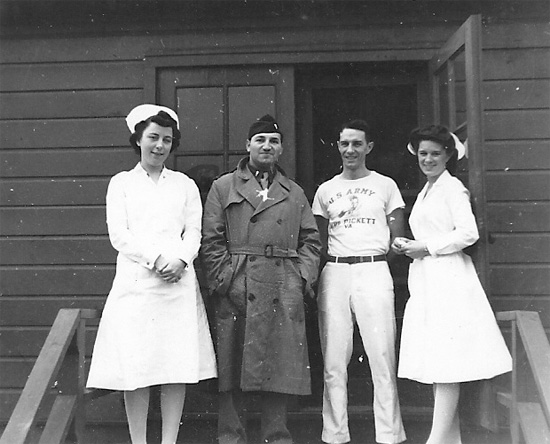
Photo illustrating First Lieutenant Henry Cymerman in good company, including a member of Camp Pickett Station Hospital and two Nurses.
With official Letter dated 10 October 1942 and in reply to Dr. Cymerman’s request for a possible assignment in a General Hospital run by the U.S. Army Medical Department, and by order of the Secretary of War, signed by Major General J. A. Ulio, The Adjutant General, Henry Cymerman was temporarily appointed and commissioned in the Army of the United States as First Lieutenant, Medical Corps (as the formula stated: “for the duration of the war and six months thereafter unless sooner terminated” –ed).
With Special Orders No. 277 contained in Letter from the War Department, Washington D.C., dated 12 October 1942, First Lieutenant Henry Cymerman, MC, O-499838, was ordered to proceed to Headquarters, Third Service Command, Baltimore, Maryland, to be informed about his assignment and station.
His official entry into active duty came with Special Orders No. 256, dated 26 October 1942, when as a First Lieutenant in the Medical Corps, he was released from Headquarters, Third Service Command, and assigned to the 1318th Service Unit, stationed at Camp Pickett, Blackstone, Virginia. Upon arrival and registration, the Officer’s “Military Fingerprints Card” (FBI and Department of Justice requirements) were duly completed and fingerprints taken. Apart from operating as a Division Training Camp and later housing a Convalescent Hospital, Camp Pickett became a dedicated Medical Replacement Training Center, replacing the one at Camp Lee which closed in the summer of 1942.
Once World War Two began for the U.S. and Henry Cymerman received his commission, he and his wife together with their first daughter (Isabel) elected to move to Farmville County, Virginia, where they found married couple accommodations (at the time he was serving as a First Lieutenant at Camp Pickett Station Hospital, Blackstone, Virginia). The couple would remain there until Lieutenant Cymerman and his unit were sent overseas to the European Theater in October 1943.
Dr. Cymerman obtained the following qualification resulting in Military Occupational Specialty Number MOS 3100, as authorized by A.R. 615-26.
Definition: Medical Officer, General Duty (MOS 3100)
Medical Officer; performs various medical functions either in hospital, dispensary, or field unit. On hospital duty, writes case histories and examines and treats sick and wounded personnel; on field duty, is responsible for treatment of illness and injury, including battle casualties, collection and evacuation of sick and wounded, and technical and tactical control of medical unit to which assigned. Supervises and instructs enlisted personnel in care and treatment of injury and disease. Depending upon the organization to which assigned, performs duties entirely professional or largely administrative and tactical in nature. Must be graduate of Medical School approved by The Surgeon General and have completed 1 year internship.
While serving at Camp Pickett Station Hospital, First Lieutenant H. Cymerman was granted “leave of absence” for a period of 6 days, starting on or after 23 May 1943, by Special Orders No. 128 and Letter dated 8 May 1943.
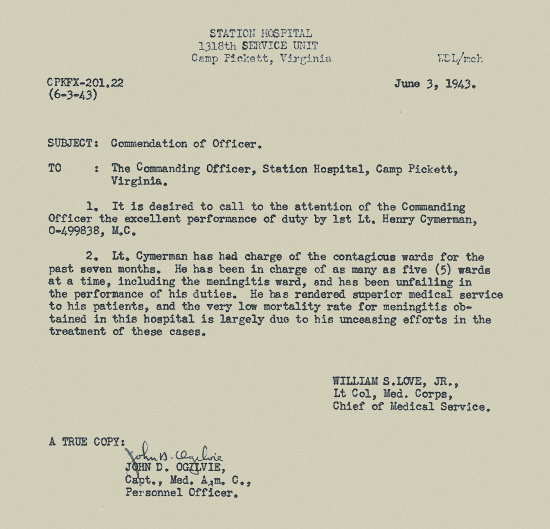
Document dated 3 June 1943, congratulating First Lieutenant Henry Cymerman for his excellent performance of duty for the past 7 months. While in charge of 5 different wards he managed to efficiently control the meningitis epidemic keeping a very low mortality rate at Camp Pickett Station Hospital.
On 3 June 1943, his CO received a Letter of Commendation, signed by Lt. Colonel William S. Love, Jr., MC, Chief of Medical Service, 1318th SU, Camp Pickett, Virginia, congratulating Lieutenant Cymerman for the excellent performance of duty conducted while in charge of 5 different contagious wards lasting 7 consecutive months (Dec 42 – Jun 43), including handling the meningitis outbreak reaching a very low mortality rate due to his unceasing efforts and superior medical service (Henry Cymerman was therefore appointed Chief of Communicable Diseases Section at the Station Hospital, 4 June 1943, and later granted his additional MOS 3116 specialty). Apart from his new responsibilities, he was also detailed to take physical inventory of alcoholic and narcotic supplies in the Pharmacy, and requested to remain on duty after regular work hours in the hospital area at all times (50% of the Hospital Officers were required to remain available for duty at all times).
Definition: Medical Officer, Communicable Disease (MOS 3116)
Medical Officer, Communicable Disease; diagnoses and treats patients who have communicable diseases. Supervises isolation precautions; suggests preventive measures to rest of command to prevent spread of communicable diseases; is consultant to other medical services in this specialty. In addition to working with communicable diseases, will usually be assigned to pediatric service for children eligible for military medical care. Should have training or experience in Communicable Diseases, either in residency or private practice. Must be graduate of Medical School approved by The Surgeon General and have completed 1 year internship.
Movement Overseas:
With rumors circulating about a possible future overseas assignment following the development of the military situation in Europe and more particularly the build-up of United States Forces in the United Kingdom, some units were targeted for overseas service. On 17 July 1943, First Lieutenant H. Cymerman, O-499838, received an official certificate stating that, following final type physical examination as required by Section IV, War Department Circular # 85, of 27 March 1943, he was declared physically and mentally fit for overseas service.
In consideration of Preparation for Overseas Movement (POM), extra training for Officers and Enlisted personnel was initiated at the Station Hospital, with extra courses, lectures, and practice.
On 5 August 1943, First Lieutenant Henry Cymerman was recommended for promotion to the grade of Captain in the Medical Corps. There was a vacancy for Ward Surgeon, Medical Service, to be occupied at Camp Pickett Station Hospital, and his promotion was considered to be to the best interests of the service. At the time 18 Medical Officers were allotted by the current T/O but only 11 had been assigned. Following this recommendation, Lieutenant Cymerman received orders, dated 7 August 1943, to proceed to Camp Patrick Henry, Oriana, Virginia for temporary duty (TDY), due to arrive not later that 1200 hours, 9 August 1943, and report to Lt. Colonel Philip Moisson, CO, Military Police Detachment (upon completion, he was to return to his proper station –ed).

Copy of “Check List for Incoming Officers and Nurses” dated 20 September 1943, issued by Headquarters 307th Station Hospital, Camp Lee, Virginia. Every newcomer received such a document, emanating from the CO, Colonel Herbert H. Price, MC.
Lieutenant Cymerman was granted another 6-day “leave of absence” to be effected on or after 29 August 1943, with Special Orders No. 233 and Letter dated 21 August 1943.
With Special Orders No. 220, dated 14 September 1943, Paragraph 30, issued by Headquarters, Third Service Command, Baltimore, Maryland, the following Officers were released from current assignment and assigned to the 307th Station Hospital, Camp Lee, Virginia (activated 15 April 1943 at Camp Lee, Petersburg, Virginia):
Officers released from 1318th Service Unit, Camp Pickett, Virginia
Major Shakir T. Ilyas, MC, O-357613
Major Nathan Wolfe, MC, O-346059
First Lieutenant Milton Ackerman, MC, O-464973
First Lieutenant Martin A. Blaker, MC, O-1696159 (for ltd serv only)
First Lieutenant Walter Buckner, MC, O-1696532 (for ltd serv only)
First Lieutenant Henry Cymerman, MC, O-499838 (for ltd serv only)
First Lieutenant Patrick U. DeVito, MC, O-1689225 (for ltd serv only)
Joining the above-named Officers, another Officer contingent was equally assigned to the 307th Station Hospital. They included:
1301th Service Unit, Reception Center, New Cumberland, Pennsylvania
Major Edgard A. Miller, MC, O-145978
1321st Service Unit, Fort Eustis, Virginia
First Lieutenant Raymond J. Lutz, MC, O-449554 (for ltd serv only)
First Lieutenant James P. J. McEvilly, MC, O-1695842 (for ltd serv only)
1322d Service Unit, Fort George G. Meade, Maryland
First Lieutenant Richard E. H. Duisberg, MC, O-1692298
1325th Service Unit, Indiantown Gap Military Reservation, Pennsylvania
First Lieutenant Ralph Markley, MC, O-283772
1326th Service Unit, Camp Lee, Virginia
Lieutenant Colonel Morris Chase, MC, O-305876
Captain Robert S. Pressman, MC, O-411540 (for ltd serv only)
First Lieutenant Isadore Slovin, MC, O-1683625 (for ltd serv only)
First Lieutenant Leon M. Weiss, MC, O-502083
1340th Service Unit, Aberdeen Proving Grounds, Maryland
Lieutenant Colonel Richard B. Hullsiek, MC, O-335683
First Lieutenant Michael J. Hurley, MC, O-525532 (for ltd serv only)
First Lieutenant Maxwell Soiffer, MC, O-498854 (for ltd serv only)
1341st Service Unit, Edgewood Arsenal, Maryland
Captain Glenn A. H. Deibert, MC, O-306173
All the selected Officers were to proceed and report not later than 30 September 1943 (authorized by War Department, Army Service Forces, Adjutant General Office, Washington D.C., AG 210.31, (6 August 1943), OC-B, dated 7 September 1943).
The 307th Station Hospital activated at Camp Lee, Virginia, on 15 April 1943, was constituted in accordance with T/O & E 8-560, dated 22 July 1942, consisting of 40 Officers – 1 Warrant officer – 75 Nurses – 392 Enlisted Men. It was assigned to Third Service Command with personnel and equipment of the 223d General Hospital, subsequently inactivated.
Following Special Orders No. 260 and Letter dated 17 September 1943, First Lieutenant Henry Cymerman was granted one more “leave of absence” for 6 days, effective on or after 20 September 1943.
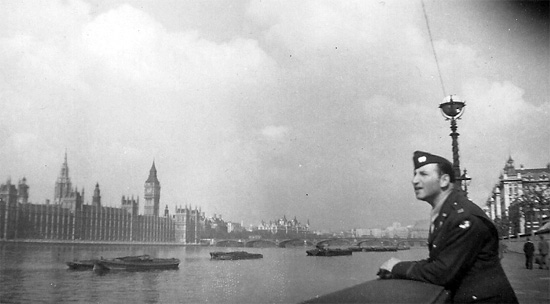
Photo of First Lieutenant Henry Cymerman while on leave in London. The illustration shows the bank of the River Thames as well as the Houses of Parliament and Big Ben. Photo taken in May 1944.
Lieutenant H. Cymerman was officially welcomed at Camp Lee, Petersburg, Virginia (important Army Service Forces Replacement Training Center –ed) by Letter dated 18 September 1943 and signed by Colonel Herbert H. Price, MC, Commanding Officer, 307th Station Hospital. The necessary instructions for the newcomers, including a checklist for incoming Officers and Nurses, as well as a list of items to be issued by the unit and to be purchased by the Officers were attached.
After joining the 307th Station Hospital a number of Officers were assigned to the Principal Duty and the Professional Service as from 2 October 1943. Please consult the list below:
| Name | Professional Service | Principal Duty | MOS Number |
| Lt. Colonel Richard B. Hullsiek | Surgical Service | General Surgeon | 3150 |
| Lt. Colonel Morris Chase | Medical Service | General Medical Officer | 3100 |
| Major Shakir T. Ilyas | Surgical Service | Orthopedics Officer | 3153 |
| Major Edgar A. Miller | Medical Service | General Medical Officer | 3100 |
| Major Nathan Wolfe | Surgical Service | General Surgical Office | 3150 |
| Captain Leon Boim | Surgical Service | Surgical Service | 3150 |
| Captain Robert S. Pressman | Medical Service | Cardiology Officer | 3107 |
| First Lieutenant Milton Ackerman | Laboratory Service | Pathology Officer | 3325 |
| First Lieutenant Michael J. Badeen | Surgical Service | General Surgeon | 3150 |
| First Lieutenant Martin A. Blaker | Medical Service | General Medical Officer | 3100 |
| First Lieutenant Walter Buckner | Medical Service | General Medical Officer | 3100 |
| First Lieutenant Henry Cymerman | Medical Service | Communicable Diseases | 3116 |
| First Lieutenant Patrick U. DeVito | Medical Service | General Medical Officer | 3100 |
| First Lieutenant Richard E. H. Duisberg | Medical Service | Neuro-Psychiatry Officer | 3130 |
| First Lieutenant Raymond J. Lutz | X-Ray Service | Roentgenology Officer | 3306 |
| First Lieutenant James P. McEvilly | Surgical Service | General Surgeon | 3150 |
| First Lieutenant Isadore Slovin | Surgical Service | General Surgeon | 3150 |
| First Lieutenant Leon M. Weiss | Surgical Service | Ophthalmology Officer | 3106 |
(Four Officers newly assigned to the 307th were not listed among the above).
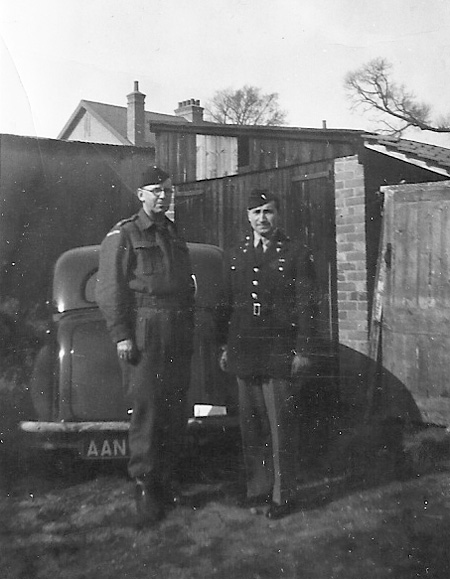
Photo of First Lieutenant Henry Cymerman in the company of an unknown British Officer. Photo taken somewhere in England in spring of 1944.
United Kingdom:
The 750-bed 307th Station Hospital received its marching orders and was instructed to move without delay from Camp Lee to stage at the New York Port of Embarkation. An Advance Detachment, 307th Station Hospital, was to proceed from Camp Lee, Virginia, to New York POE, to effect a permanent change of station. The Detachment departed Camp Lee on 24 September 1943.
Following Special Orders No. 235 and Letter dated 1 October 1943, First Lieutenant Henry Cymerman was granted one last “leave of absence” for 2 days, effective on or after 1 October 1943, the very last one obtained while stationed at Camp Lee, before departing for overseas.
The Advance Detachment left New York POE 1 October 1943 on the RMS “Aquitania” (NY 230) and arrived in the United Kingdom 9 October 1943.
The second (main) group entrained at Camp Lee, Virginia, 28 October 1943 and reached Camp Kilmer, New Jersey (Staging Area for New York Port of Embarkation –ed) the following day. It finally left New York POE 5 November 1943 sailing on the S/S “Brazil” (NY 516) and arriving in the United Kingdom on 17 November 1943 (Lieutenant Cymerman received his marching orders on 26 October 1943 from Headquarters Camp Lee, with instructions to proceed to Camp Kilmer, New Jersey, for staging).
The 307th was not to merely function as a standard Station Hospital medically supporting troops at the post or nearby units stationed in the vicinity thereof. It was however to participate in a fairly new development involving a number of Station Hospitals recently arrived and/or already operating in the United Kingdom.
Development of Rehabilitation Centers in the United Kingdom
The main reason for developing and establishing Rehabilitation Centers was to prepare convalescing military personnel for further military service or for discharge (depending on the nature of their wounds and disability). The plan was as follows: a patient was accepted from the hospital where he was being treated as soon as possible after he had reached the convalescent stage. He was then subjected to a specific physical therapy or remedial exercises as well as general reconditioning and hardening, which reduced the convalescence period to a minimum and prepared the soldier to return to duty in a strong and able physical condition. His physical ability and mental attitude were important factors to complete his rehabilitation.
A first unit and site were selected, leading to the establishment of Rehabilitation Center No. 1 at the All-Saints Hospital, Bromsgrove, Worcestershire, England. A provisional T/O & E was prepared by the Office of the Chief Surgeon, based upon personnel and equipment of a 150-bed Station Hospital, and 5 Officers and 6 EM with the proper qualifications were trained by the British at Kingston and Aldershot. The facility opened on 7 April 1943, and was operated by the 16th Station Hospital augmented by specially trained personnel with Major Clayton H. Hixson, MC, in command.
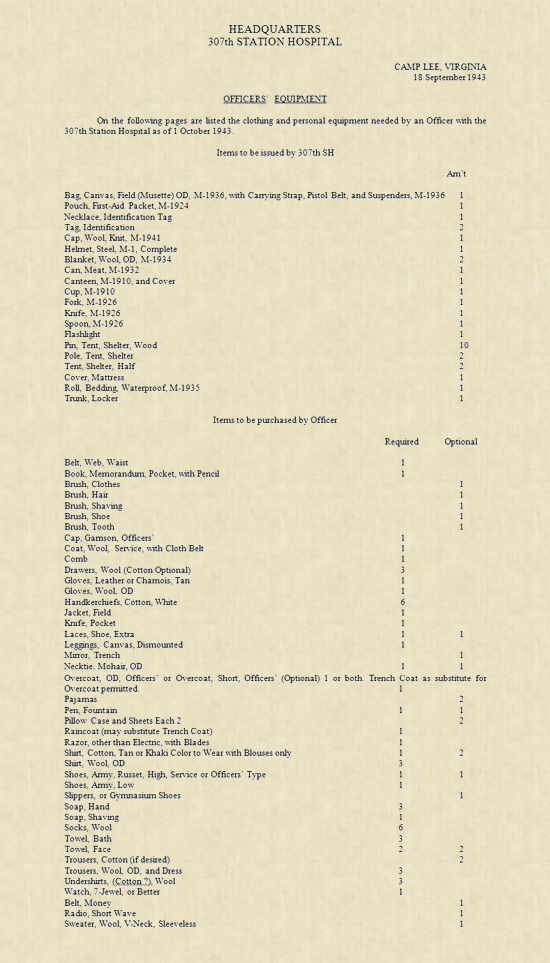
Copy of “List of Items to be Issued by the 307th SH” and “List of Items to be Purchased by the Officer” dated 18 September 1943. This list accompanied the official Check List received by newly-appointed Officers and Nurses assigned to the 307th Station Hospital, Camp Lee, Virginia.
The facilities at Bromsgrove soon proved insufficient to handle the convalescent patient load and consequently, a general hospital site was secured at Stoneleigh Park, Kenilworth, Warwickshire, with the 8th Convalescent Hospital replacing the 16th Station Hospital as the unit now operating Rehabilitation Center No. 1. Key personnel of this Hospital were transferred to and remained at the 8th Conv Hosp, which opened the new center 5 October 1943 under command of Major Frank E. Stinchfield, MC.
As orders were received to release the 8th Convalescent Hospital for a new assignment it was gradually replaced by the 750-bed 307th Station Hospital with key personnel from the 8th being trained and Major Frank E. Stinchfield, MC, O-407393 still in command. The complete exchange was finalized on 5 December 1943.
The advent of the new Rehabilitation Centers brought along a number of VIPs, all keen to visit the new facilities. There’s photographic proof that Lieutenant General Omar N. Bradley visited the 307th Station Hospital 3 December 1943; another inspection under the direction of Major General Norman T. Kirk, accompanied by Brigadier General Malcolm C. Grow, and Lieutenant Colonel Rex L. Diveley, took place in February 1944; and yet another visit to the 307th was led by Lieutenant General John C. H. Lee in February 1945 (the latter visited the 826th Convalescent Center 15 February 1945, and toured the facilities from 1705 to 1800 hours).
Having decided that it would be better to segregate Officers and Enlisted Men, Rehabilitation Center No. 2 was activated at All-Saints Hospital with a detachment of trained personnel from the 307th Station Hospital assisted by extra people pertaining to the 1st Auxiliary Surgical Group. Later, when the 77th Station Hospital had been made available for the Rehabilitation program, a detachment relieved the men from the 307th Sta Hosp on 23 February 1944.
As the incoming patient load continued to increase, experience indicated that certain patients only needed general exercises or body hardening to improve their physical condition (reconditioning), while others required more specific exercises in addition to general reconditioning (rehabilitation). The staff of the 77th Station Hospital (already committed at the Rehabilitation Center No. 2 for Officers therefore first completed a training and indoctrination course before moving to Erlestoke Park, eventually beginning to operate Reconditioning Center No. 1 in March 1944). A military site was secured at Packington Park, near Coventry, for expansion, with an advance party of the 77th Sta Hosp moving in to this extra facility on 5 July 1944.
Special Orders No. 183, dated 1 July 1944, Paragraph 37, issued from ComZ, ETOUSA, temporarily promoted First Lieutenant Henry Cymerman, MC, O-499838, to the grade of Captain.
Following the growing flow of patients from increased continental operations, it became apparent that additional beds for rehabilitation would be required. The 313th Station Hospital was selected for conversion into a 3000-bed Rehabilitation Center. A suitable site designated Rehabilitation Center No. 3 was finally obtained at Warminster Barracks, Warminster, Wiltshire, which opened after some adaptation works on 21 December 1944 .
With all centers about filled, there was need for an additional Rehabilitation Center. The 314th Station Hospital operating a tented-hospital at Truro, Devonshire, was selected and after training moved to Honiton-Heathfield to set up Rehabilitation Center No. 4 with a maximum capacity of 3,000 patients/trainees.
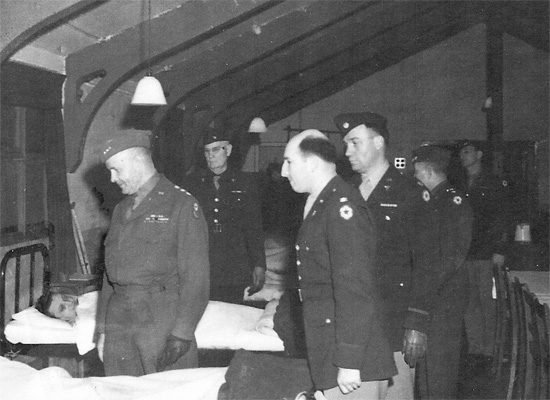
Photo illustrating the inspection and visit of the 307th Station Hospital / 826th Convalescent Center by Lt. General John C. H. Lee, CG, Services of Supply, ETOUSA. The event took place 15 February 1945.
On 17 October 1944, Captain H. Cymerman, 307th Station Hospital, was instructed to proceed from his current station to a Port of Embarkation designated by the Transportation Corps for a temporary assignment as Medical Attendant on a US ship upon which United States Army patients were being returned to the Zone of Interior. Upon completion of this duty he was to return to his station in the ETO by the first available surface transportation (the personnel involved were authorized a leave of absence of maximum 10 days plus travel time, while in the United States). The group consisted of 3 MC Officers, 10 Nurses, and 1 NCO, pertaining to the 3d Station Hospital – 10th General Dispensary – 67th General Hospital – 83d General Hospital – 130th Station Hospital – 186th General Hospital – 306th Station Hospital – 312th Station Hospital and 327th Station Hospital.
Following completion of this special duty, Captain H. Cymerman, now attached to New York Port of Embarkation, Camp Kilmer Section, was granted “leave of absence” for a period of 15 days, as from 30 October 1944.
As per orders dated 9 October 1944, the 307th Station Hospital was to be disbanded at the earliest practical date at its current station within the United Kingdom Base, and personnel and equipment of the unit disposed of as directed ETO Headquarters. The organization was effectively disbanded on 22 November 1944.
As the first Rehabilitation and Reconditioning Centers were operating it became clear that the selected T/O & Es did not provide for sufficient personnel with the appropriate qualifications to operate such large organizations. Therefore new Tables of Organization and Equipment were created for 1,000-bed Reconditioning and 3,000-bed Rehabilitation Centers (approved 23 June 1944 –ed). Conversions started early December 1944 with 5 Station Hospitals being converted (they were in fact disbanded –ed), activated, and designated as follows:
| Current designation | New designation | Bed capacity |
| 77th Station Hospital (Reconditioning Center No. 1) | 825th Convalescent Center | 3,000 |
| 307th Station Hospital (Rehabilitation Center No. 1) | 826th Convalescent Center | 3,700 |
| 313th Station Hospital (Rehabilitation Center No. 3) | 827th Convalescent Center | 3,000 |
| 314th Station Hospital (Rehabilitation Center No. 4) | 828th Convalescent Center | 2,300 |
| 123d Station Hospital (Rehabilitation Center No. 2) | 833d Convalescent Camp | 400 |
Above Convalescent Centers were later attached to the 12th Hospital Center established at Great Malvern which controlled the nearby cluster of hospitals located in Bromsgrove, Stoneleigh Park, and Erlestoke. Each Hospital Center, would eventually include some 30 Medical Officers and 230 Enlisted personnel, operating a Headquarters, a Service Company, a Convalescent Camp, and a Laboratory. The Center was commanded by Colonel Asa M. Lehman, MC.
With Hospital Order Number 10, dated 8 February 1945, emanating from Headquarters, 826th Convalescent Center, 12th (US) Hospital Center, APO # 118, United States Army, Captain H. Cymerman was, in addition to his other duties, detailed as Assistant Battalion Surgeon, 3d Battalion.
Orders ref. AG 201 L 5-793 dated 13 May 1945, issued by Headquarters, United Kingdom Base, APO # 413, U.S. Army, instructed Captain Henry Cymerman, O-499838 and Captain Justin Fleischman, O-532394, to proceed from their present station in the United Kingdom to Paris, France, and report there on or before 1400 hours, 20 May 1945, to the “Army Athletic Staff School”, Cité Universitaire, 19 Boulevard Jourdan, Paris XIV, on temporary duty (TDY) for a period of 9 days, for the purpose of attending the Athletic Instructors’ Course, and upon completion of this duty will return to their proper station. The Officers were to carry bedding rolls and quarters and/or rations were to be reimbursed as authorized. The reason for the trip was to get better acquainted with physical reconditioning methods to be applied at the Convalescent Centers in the United Kingdom Base.
Each Officer attending the “Army Athletic Trainers’ Instructor Course” at the Army University Center in Paris, France, received a committee assignment to work on, he was also to draw the necessary athletic clothing as well as the manuals required for the different sessions of the program. Attendance was mandatory. The AASS (Army Athletic Staff School) was run by Major H. A. Johnson, Director and Commanding Officer, and First Lieutenant C. A. Enlow, Executive Officer, assisted by 4 additional Officers and a staff of 18 Instructors.
The Program for Trainer Officers lasted 6 days and included a number of separate lectures given by individual instructors and covering several topics. Equipment, supplies, field kits, and general training were discussed but also injuries and preventive taping of body parts were included in the program.
The aim of the program was to appoint Athletic Officers in charge of the formulation of the policies governing athletic activities to be put in operation within their unit or Base Section. Furthermore their responsibilities were to include the operation of the Athletic Program in the field – the coordination of the Army Education, Athletic and Recreation Programs in general – the Training of personnel within their specific command – the general program for Readjustment of Military Personnel after Defeat of Germany, and more particularly for Officers like Captain H. Cymerman, the physical reconditioning of patients residing at the Convalescent Centers in the United Kingdom.
Special Orders No. 140, dated 20 May 1945, and issued by Headquarters, United Kingdom Base, U.S. Army, announced changes in assignment. Captain Henry Cymerman and Captain Justin Fleischman, both serving with the 826th Convalescent Center were to be assigned to the 6868th Rehabilitation Training Detachment in exchange for two other Officers who were transferred to the 826th Convalescent Center.
Finale:
As per 13 May 1945, Captain Cymerman’s Adjusted Service Rating score reached 74 points. Due to the rather low number of collected points, the Officer stated his desire to be retained in the service during the present emergency …
With Special Orders No. 191, Headquarters 826th Convalescent Center, APO # 413-A, dated 3 July 1945, Captain H. Cymerman was released of assignment and was attached unassigned to the Detachment of Patients, 4175, US Army Hospital Plant, APO # 121 for treatment. After having completed his treatment, he was released and transferred to the 98th Reinforcement Battalion, APO # 508-A. Following Special Order No. 64, dated 9 October 1945, issued by 98th Reinforcement Battalion, Ground Forces Reinforcement Command, European Theater, APO # 63-A, United States Army, Captain Cymerman was released from his assignment to the 342d Reinforcement Company and transferred for assignment to the 182d General Hospital, APO # 519-A.
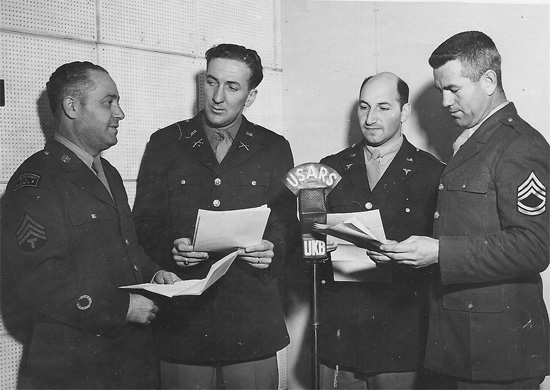
Photo taken at Headquarters, United Kingdom Base, ETOUSA, 5 May 1945. Through the facilities of the U.S. Army Radio Service (USARS), 4 residents of the New York area, now serving with the 826th Convalescent Center in the United Kingdom were allowed to broadcast home over Radio Sation WNYC, New York. From L to R: Technician 4th Grade Bernard Whitney – First Lieutenant Thomas J. Mooney – Captain Henry Cymerman – and Technical Sergeant Robert N. Nugent.
In November of 1945, Captain Cymerman was listed for duty with a troopship, and subsequently assigned to its Dispensary Team. He was to proceed to Southampton Port of Embarkation, Headquarters Tidworth Staging Area, United Kingdom Base, ComZ, USFET, APO # 519, U.S. Army. Official Orders were received 2 November 1945, indicating that he was to command the Medical Team (12 EM from the 182d Gen Hosp) aboard the S/S “George M. Bibb” escorting patients returning to the Zone of Interior. Upon completion of this temporary duty, the Officer was to join his parent unit upon arrival in the Zone of Interior. The troopship most probably left Southampton, England, shortly after 5 November, reaching Boston, Massachusetts 19 November 1945.
Following Special Orders No. 326, Army Service Forces, Second Service Command, Reception Station No. 2, 1262d Service Command Unit Personnel Center, Fort Dix, New Jersey, dated 22 November 1945, Captain Cymerman (along with a large number of other Officers) was released from attachment unassigned to the Reception Station, granted terminal leave and allowed to proceed home, following date of release from the SC and official date of Separation. Captain Henry Cymerman, MC, O-499838, was granted terminal leave and travel time of 2 months and 17 days, and was to revert to inactive duty status by 11 February 1946. He received his promotion to the temporary grade of Major the same day.
After the war, Dr. Cymerman bought a house – near his brother-in-law’s pharmacy – devoting two downstairs rooms to his office. The family – now with two daughters – eventually outgrew this and moved to Queens, New York.
Military Promotions
First Lieutenant, Medical Corps, Army of the United States (10 October 1942)
Captain, Medical Corps, Army of the United States (1 July 1944)
Major, Medical Corps, Army of the United States (11 February 1946)
Military Assignments
Headquarters, Third Service Command, Baltimore, Maryland (26 October 1942)
1318th Service Unit, Camp Pickett, Blackstone, Virginia (26 October 1942)
Chief of Communicable Diseases Section, Station Hospital, Camp Pickett, Virginia (4 June 1943)
Camp Patrick Henry, Oriana, Virginia (7 August 1943)
307th Station Hospital, Camp Lee, Petersburg, Virginia (14 September 1943)
826th Convalescent Center (8 February 1945)
Sent on Temporary Duty to London, England for 2 days (30 April 1945)
Followed Athletic Instructors’ Course in Paris, France for 9 days (13 May 1945)
6868th Rehabilitation Training Detachment (20 May 1945)
342d Reinforcement Company, 98th Reinforcement Battalion, Ground Forces Reinforcement Command
(12 September 1945)
182d General Hospital (9 October 1945)
Dispensary Team, S/S George M. Bibb Troopship (2 November 1945)
1262d Service Command Unit, Separation Center, Fort Dix, Wrightstown, New Jersey (20 November 1945)
Commendation Letter
For Excellent Performance of Duty in Charge of Contagious Wards at Station Hospital, Camp Pickett, Blackstone, Virginia (3 June 1943)
Military Awards & Decorations
American Campaign
European-North African-Middle Eastern Campaign
World War Two Victory
The MRC Staff are particularly indebted to Isabel Cymerman, daughter of Captain Henry Cymerman, MC, O-499838, Medical Officer who served with the 307th Station Hospital in the Zone of Interior and overseas, and the 826th Convalescent Center plus a number of miscellaneous units attached to the United Kingdom Base, during World War Two. Without her kind help this Testimony would not have been written. We very much appreciated her sharing copies of many precious personal documents and photographs relating to Captain Cymerman’s service years. The MRC Staff are still looking for a complete personnel roster of subject Hospital.
